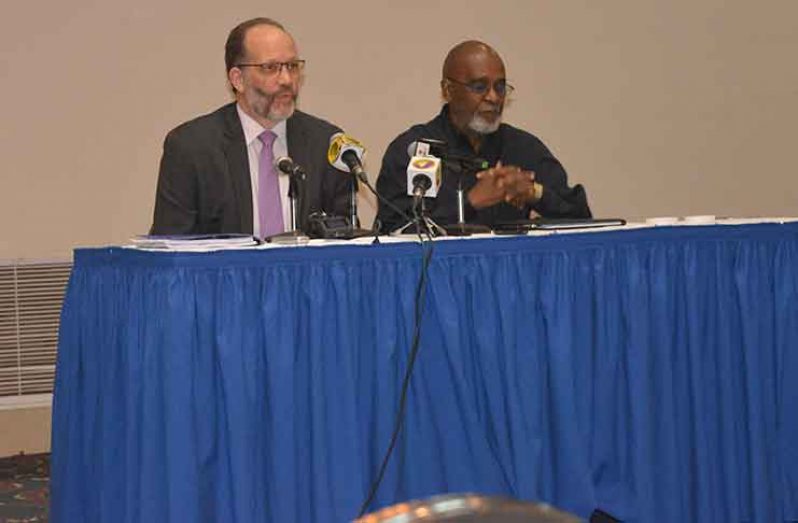…CARICOM Heads of Government to consider report
By Svetlana Marshall in Jamaica
A REGIONAL Commission on Marijuana has made recommendation for the decriminalization of marijuana across CARICOM Member States but in controlled and regulated amounts as in the case of alcohol.
The call to legalise marijuana in the region forms part of a menu of recommendations that will be placed under the microscope when the Thirty-Ninth Regular Meeting of the Conference of Heads of Government of the Caribbean Community (CARICOM) is held later this week at the Montego Bay Convention Centre in Jamaica.
At a press conference on Monday at the Jamaica Pegasus, CARICOM Secretary General, Ambassador Irwin LaRocque told journalists that the Report of the Marijuana Commission will be presented to the Regional Leaders by the Chair, Professor Rosemarie Belle-Antoine of the St Augustine campus of the University of the West Indies. The Regional Commission on Marijuana was established by the decision of the Twenty-fifth Inter-Sessional Meeting of CARICOM Heads of Government in March 2014 with a mandate to investigate the use of marijuana.
Ambassador LaRocque said the 10-member commission, which is made up of experts in the fields of medicine, medical and social research, law, education, psychiatry and criminology, analysed the social, economic, health and legal issues surrounding marijuana use, and has made some far reaching recommendations with regards to the decriminalisation of the cannabis. The recommendations are also based on extensive consultations in Antigua and Barbuda, Barbados, Belize, the Bahamas, Guyana, Montserrat, St. Kitts and Nevis, St. Vincent and the Grenadines and Suriname.
“They are recommending the decriminalisation of marijuana. They are recommending that it be deemed a substance that is controlled and managed as alcohol,” the Secretary General said while noting, however, that there is some concern about controlling it in terms of youth and adolescent use.
Medical marijuana
In the report, the commission also made a case for legislation to be put in place to allow for research on medical marijuana. “Certainly the commission encourages in addition to the decriminalisation of marijuana, freeing up marijuana for scientific proposes for medical use, within that context I would imagine that one could allow for trade for medicinal marijuana,” he explained.
Ambassador LaRocque told the Guyana Chronicle that in compiling the report, the commission led by Professor Belle-Antoine took into consideration existing laws in some Member States that are cause for concern. “One thing that I read in the report that stands out in my mind so much is that there are in some Member States where the penalty for a small amount of marijuana is sometimes more than some of the other more heinous crimes in the community. Now how can that be?
How is it that you can have a youth with a small amount of marijuana or anybody, with small amounts of marijuana and the penalty for such a thing is higher,” Ambassador LaRocque reasoned while noting that it defies logic.
Last February, the Antigua and Barbuda lower house of parliament voted in favor of the Misuse of Drugs (Amendment) Bill – a move which paves the way for decriminalizing the possession of up to 10 grams of cannabis.
In Jamaica the possession of as much as two ounces or 56 grams of marijuana was amended to a petty offence in 2015. Other Caribbean islands have also moved to decriminalise small quantities of the plant but in countries like Guyana it remains illegal.
Just recently, the jailing of a father of three for the possession of eight grams of marijuana had stirred up much debate with the Alliance for Change (AFC) calling for the removal of custodial sentences for small amounts of the herb.
The party, which is part of the coalition government, said it is time legislators move with alacrity to upgrade the laws of Guyana to ensure that custodial sentences for small quantities of marijuana are removed from the books in their entirety. “Custodial sentences serve, in large measure, to criminalise young people, particularly young men who have been caught with small quantities of marijuana – an offence which is a mere error in judgment and not representative of criminal behaviour,” the AFC said.
AFC Member of Parliament, Michael Carrington, since 2015 had tabled a bill in the National Assembly for debate but it has since been languishing on the order paper, being deferred time and time again. “The time to act is now. We must no longer sit idly by and allow our young men and women to be sentenced to several years of jail time alongside hardened criminals, murderers and rapists.
“We will not be found complicit in destroying the lives of our young people and wounding our society rather than acting to heal it,” the AFC said. In Guyana more than five grams of cannabis can land a person in jail for three years. The Guyanese Rastafarian Council is also advocating for marijuana-related laws to be reformed, contending that the Rastafarian community uses the herb for religious and meditative purposes.




.jpg)









